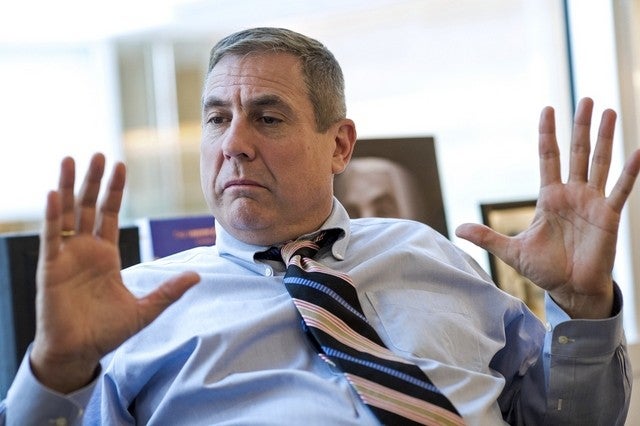By: Frank Kane
The National
It was a masterclass in high-powered networking, watching Danny Sebright work a room at a recent event in the U.S. capital.
The occasion was an iftar held by the investment promotion organisation SelectUSA, and the venue was the hallowed halls of the U.S. Chamber of Commerce, a stone’s throw from the White House. The guests were Middle East businessmen and financiers along with their U.S. counterparts, and a sprinkling of officials from the U.S. departments of state and commerce.
Mr Sebright was there as president of the U.S.-U.A.E. Business Council, the trade promotion organisation that serves as a facilitator for good business relations between the countries. But he moved easily between the commercial, diplomatic and government representatives there, and seemed to know everybody in the 200-strong crowd.
“He’s in his natural habitat,” said one guest, a senior state department official.
Mr Sebright has had plenty of time to get accustomed to the corridors of power in DC, and the ways of the Middle East. He began his career as an intelligence officer in the Defence Intelligence Agency and served on-site in the region. When the 9/11 attacks took place, he was working for Donald Rumsfeld, then the U.S. Defence Secretary.
After a time spent helping direct the “global war on terrorism”, he went into private strategy consulting, first with the Cohen Group and then in 2008 as head of the newly created council.
The council is a non-profit trade promotion body, paid for by fees from some of the biggest names in U.A.E. and U.S. business. It is, very definitely, not a lobbying organisation, Mr Sebright insists. “But we still have the ability to get our views across to the administration, via our members. They can talk to the administration about the issues involved, underlining the importance of the trade relationship with the U.A.E.,” he says. The council works “hand in glove” with the U.A.E. Embassy in Washington and the American embassy in Abu Dhabi.
To a certain extent, the council was born out of the contorted political machinations that followed the purchase by DP World of the P&O ports business in 2006. In the wake of 9/11, some U.S. politicians had objected to the fact that P&O’s U.S. ports would be in Middle East hands, and effectively blocked that part of the transaction.
In particular, two New York senators, Chuck Schumer and Hillary Clinton, led a bi-partisan and successful campaign, along with some Republican leaders, against DP World’s ownership.
“They used it as a political edge during a congressional election,” says Mr Sebright, “but the battlefield preparation was not done in advance.”
 Danny Sebright says U.S.-U.A.E. trade will thrive under an American president who embraces foreign partners. Cliff Owen / AP Photo
Danny Sebright says U.S.-U.A.E. trade will thrive under an American president who embraces foreign partners. Cliff Owen / AP Photo
It was one of the functions of the U.S.-U.A.E. council to ensure such preparation would be thoroughly conducted before any future deals involving Emirati and American organisations. Its first big test came the year it was formed, when the U.A.E. sought a nuclear energy cooperation strategy with America, in a deal that needed approval under U.S. legislation. There were no DP World-style problems this time.
“We led a massive campaign of all our relevant members, which involved them going to Capitol Hill and talking of the business benefits for the U.S. of such a proposal, and explaining why the U.A.E. is a good business partner. We had 269 meetings with members over that issue, orchestrated by the Council,” says Mr Sebright. The deal was approved the following year.
The latest high-profile confrontation requiring the council’s skills has been the Open Skies dispute between airlines in the United States and their Arabian Gulf rivals. After several angry public exchanges last year, the issue has been lower-key this year, and Mr Sebright thinks that is a good sign.
“As far as I can see, the U.S. and U.A.E. are incredibly close partners in aviation, as in many other areas, and there has been no evidence of [Gulf airlines] actually doing anything wrong. The Open Skies agreements are extremely complicated and far-reaching, and I cannot see the U.S. picking all that apart. Maybe we can expect some kind of statement from the administration between the election and the beginning of the new presidency,” he says.
Which inevitably brings the conversation round to virtually the only topic on the lips of people in DC at the moment: the forthcoming U.S. election. Mr Sebright, who has served under Democratic and Republican administrations, is careful about sharing his views.
“Our job is to promote business and trade. I don’t want to criticise one candidate or another, but business will thrive under the one that is forward looking and outward going and embraces foreign partners and international trade and commerce,” he says.
“Racial profiling and Muslim-baiting will get us nowhere, and will just make the job – the promotion of commerce between the U.S. and U.A.E. – much more difficult. We’re a bilateral trade organisation so we naturally hope a candidate who supports global trade wins the election.”
But if Mrs Clinton is elected, how far will her opposition to the DP World deal colour her judgement of future U.S.-U.A.E. relations? Mr Sebright thinks not at all. “She was always pragmatic, she never had anything against the U.A.E.,” he says.
With his background in defence, and the fact that aircraft (civilian and military) and other military equipment make up a sizeable chunk of the US$22.9bn of goods and services the U.S. exported to the U.A.E. last year, the other big item on his agenda is defence.
“We get involved whenever there is a request for new weapons systems, and our main job is to underline the fact that the U.A.E. is a reliable ally that has never misused or misplaced any weapons systems that they’ve purchased in the past. The U.A.E. has worked with the U.S. on all the previous Nato campaigns in the region and elsewhere,” he says.
The question of defence sales to Arab countries is inextricably tied in with the U.S. relationship with Israel, where Mr Sebright also has first hand experience. He feels that there is scope for improving the U.A.E.-Israel relationship further.
“I’ve just got back from Israel and I know that they do not see the U.A.E. as an enemy or a threat in any way. The U.A.E. is pragmatic and practical. Maybe there will be scope for an improvement in relations when there is a more pragmatic approach by Israel with regard to Palestine,” he says.
The other big question for Middle East experts in Washington is whether the new administration that takes office next year will try to correct the impression that the U.S. is too keen to accommodate Iranian wishes, at the expense of its long-term allies in the Arabian Gulf.
“I think it was a mistake from President Obama not to bring in the Gulf states earlier in the process with Iran. The Gulf countries don’t see Iran in the same way that Obama does. They are in the same neighbourhood and see the threats and risks as very real, with no change in Iran’s behaviour since the deal was signed.
“I think if Hillary is elected she will be much more measured in her approach to Iran. She understands the importance of the close security partnership with the U.A.E. and GCC, and this will be reassuring to the GCC. But I don’t think she will walk away from the agreement with Iran,” he says.
“As for Donald Trump, it’s very difficult to get a clear picture of what his policies will be.”
